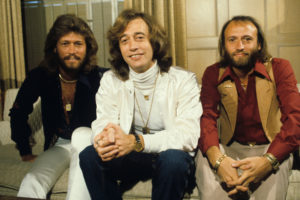 For a Beatle-crazed boy who had exhausted available content, the Bee Gees were but a short hop away, and not just in the record bins. Their greatest hits albums of 60s and 70s stuff scratched an itch for tunefulness and harmonies I couldn’t find elsewhere. Some cuts, like “Lonely Days,” boasted Beatlesque structural innovations that made them seem almost cool. And “First of May” is the soundtrack of every teenage crush—or at least all of mine. Main Course was an early favorite, and I think it is still a more than solid piece of work covering a wide emotional range.
For a Beatle-crazed boy who had exhausted available content, the Bee Gees were but a short hop away, and not just in the record bins. Their greatest hits albums of 60s and 70s stuff scratched an itch for tunefulness and harmonies I couldn’t find elsewhere. Some cuts, like “Lonely Days,” boasted Beatlesque structural innovations that made them seem almost cool. And “First of May” is the soundtrack of every teenage crush—or at least all of mine. Main Course was an early favorite, and I think it is still a more than solid piece of work covering a wide emotional range.
A signal memory is seeing the boys pre-SNF on WTTW’s Soundstage—meaning the Bee Gees had performed mere blocks from my humble home. (I also remember the Doobie Brothers show.)
“Stayin’ Alive” was so ubiquitous it almost doesn’t register as a song anymore; just part of the cultural ether. When I think of it, hear it now I remember it’s the beat you are suppose to use when doing CPR. The strongest SNF memory I have is being in a car on some highway, driving to the Old Chicago indoor amusement park (where the Jam would perform in a year or so) on a high league outing, and singing our made-up lyrics along to the radio: “How deep is your mother, how deep is she? I really want to know….” The classic move of mocking the thing you can’t admit you love.
That was the mode for the next several years, and the Bee Gees became a secret pleasure. I hated Andy Gibb and the mania that surrounded him, but I was slain by “Don’t Throw It All Away (Our Love)” and “Everlasting Love” (“Shadow Dancing” not so much). By 1979 I was so uncool and weird myself, it was not possible to lose status by admitting how much I loved “Tragedy.” And lest you think the boys were sentimental saps, they admitted the original demo for “Love You Inside and Out” had lyrics that continued, “backwards and forwards with my cock hanging out.” To say nothing of their productions for Yvonne Elliman, Dionne Warwick, even Barbra Streisand. I love it all. They had a McCartneyesque gift for hooks that can’t be denied, that is a—the?—raison d’etre of pop music.


